Tanzania's John Magufuli - the man vowing to defeat coronavirus and imperialism
- Published
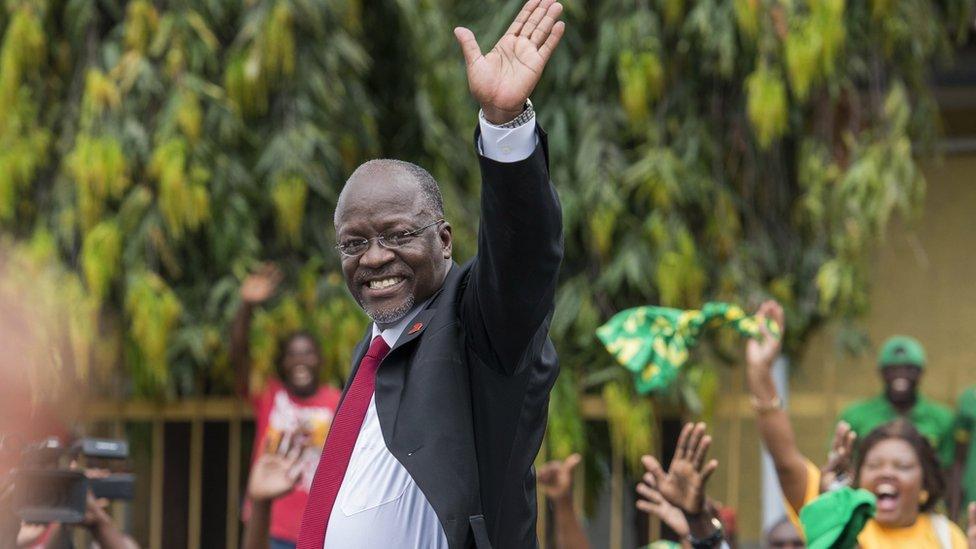
Tanzania's President John Magufuli has been criticised over his repeated attacks on "imperialists" and his recent declaration that prayers had ended coronavirus in the East African state.
But this is unlikely to bother him as, throughout his presidency of more than five years, he has styled himself as a stout African nationalist and a devout Catholic waging war against foreign powers seeking to exploit the East African nation.
"I want you Tanzanians to believe that you have a real president, a real rock. I cannot be threatened and I am not threatened," Mr Magufuli said in March 2018.
He hopes that he has cemented this reputation over the last two years, and it will secure him a second term in elections due in October.
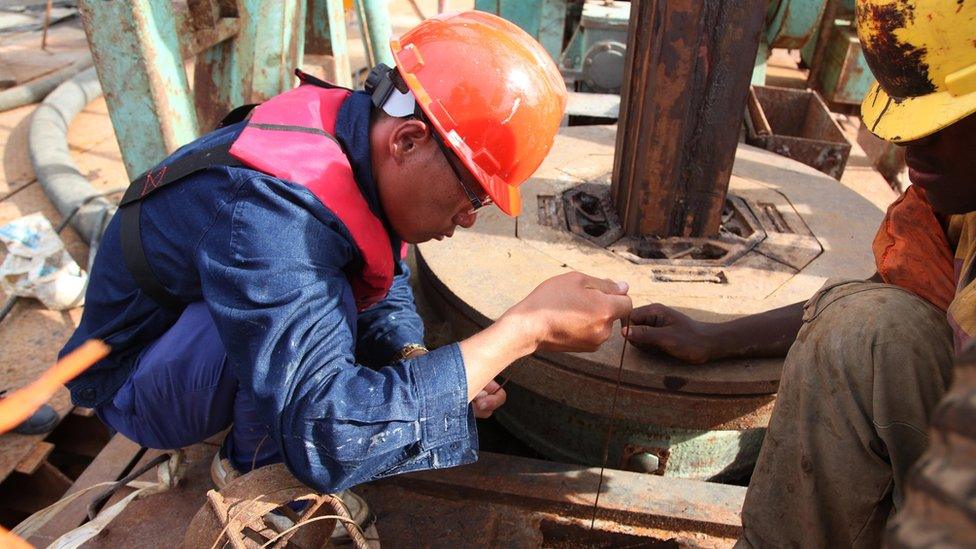
Mr Magufuli has been critical of both Western and Chinese investors
One of Mr Magufuli's biggest battles was against Canadian mining giant Barrick Gold Corp.
He demanded a 60% stake for the government in three of its gold mines to end the "exploitation" of Tanzania's resources.
The 60-year-old president cast the negotiations as a clash between a cow and a rabbit, external and, although the government eventually settled for a 16% share, the talks signalled that it was no longer business as usual.
Rejects 'madman's' deal with China
As Barrick boss Mark Bristow walked from the lectern to shake Mr Magufuli's hand at the signing ceremony in January, he said: "What it's done is challenge the mining industry and all of us to embark on something where we win together or lose together."
In his response, Mr Magufuli not only burnished his nationalist credentials, but also his religious credentials, saying: "I thank God for the success of this agreement."
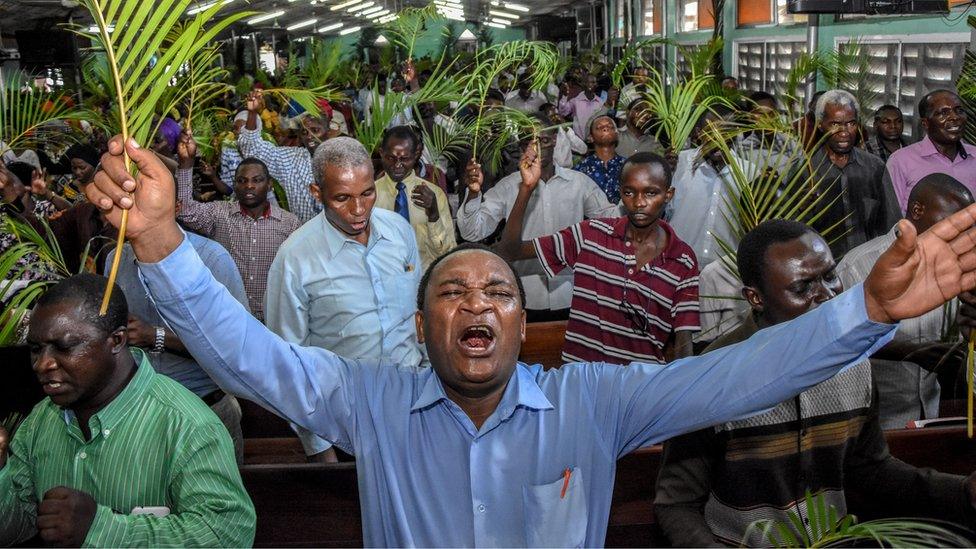
Mr Magufuli has encouraged congregational worship throughout the coronavirus crisis
He has also cancelled two deals with China: the building of Tanzania's first electric railway line linking the main commercial city Dar es Salaam to the capital, Dodoma, about 500km (310 miles) away and the construction of East Africa's biggest port in Bagamoyo, once the capital of German East Africa, at a cost of $10bn (£8bn).
Mr Magufuli said only a "madman" would accept the financial terms negotiated by his predecessor Jakaya Kikwete's government for the building of the port.
He has long blamed selfish leadership and a failure to put the nation first for Tanzania's underdevelopment.
But it is Western powers that Mr Magufuli is most suspicious of, and he accuses local "puppets" - usually a cast of opposition politicians, rights activists and critical journalists - of championing the interests of their "masters".
'A brutal pragmatist'
"This healthy suspicion sometimes fuels paranoia, which is strange for a president who has consolidated so much power," Tanzanian analyst Thabit Jacob told the BBC.
"His nationalism has also turned illiberal and populist. He is squeezing the opposition, narrowing civic space, cracking down on the media and increasing surveillance."
Bornto a peasant farmer on 29 October 1959
Became a school teacher and industrial chemist
ElectedMP for the ruling party in 1995
Served in various ministries until elected president in 2015
Famously helped clean streets and pick up rubbish after taking office
NicknamedThe Bulldozer and Chuma (Swahili for Piece of Iron)

Tanzanian writer Elsie Eyakuze said he had a "brutal pragmatism that leans on a particular world view of strong leadership.
"It does not allow for discussion or dissent about methods or outcomes as this would ostensibly weaken the government or introduce an element of chaos."
No trips to the West
Mr Magufuli has revived use of the Swahili word "beberu". It literally means "a male goat", but it was commonly used to refer to "Western imperialists" when Tanzania was fighting for independence, and when a socialist government took office following the end of British colonial rule.
Mr Magufuli has not been on a single official visit to a Western nation since coming to power. Nor has he attended, as president, sessions of the UN General Assembly, which other African leaders see as an opportunity to spell out their vision to a global audience.

You may also be interested in:
He has attended African Union summits and visited a few African countries - including Rwanda and Uganda, whose leaders in many ways share his suspicions of Western nations.
However, he puts his vision for the nation ahead of his pan-African ideals. He did not attend regional summits to discuss the coronavirus crisis, and the temporary border closure of Tanzania's borders with Zambia and Kenya point to diplomatic tensions.
Several doctors in Tanzania insist that Covid-19 is spreading fast, reports the BBC's Andrew Harding
When Uganda's President Yoweri Museveni described the regional body, the East African Community, as a "household" whose "occupants" needed to co-operate to combat the virus, Mr Magufuli - without directly referring to his Ugandan counterpart's comments - said at a church service in his home town that "we co-operate in bringing development. However, in resolving a problem, everyone has their own means".
Unlike Uganda and Rwanda, Mr Magufuli did not impose a lockdown to curb the virus, saying he feared it would cause poverty.
Unfairly singled out?
As a result, he has come under criticism from the main opposition parties, which say densely populated cities should have been under lockdown.
However, Mr Magufuli is not alone in rejecting such measures.
Data collected by the respected Africa Centres for Disease Control and Prevention (Africa CDC) shows that around a quarter of African states, including Ethiopia, did not shut down to curb the spread of the virus.
And soon after the first Covid-19 case was detected in the country in mid-March, Tanzania took measures such as closing schools and banning sports events.
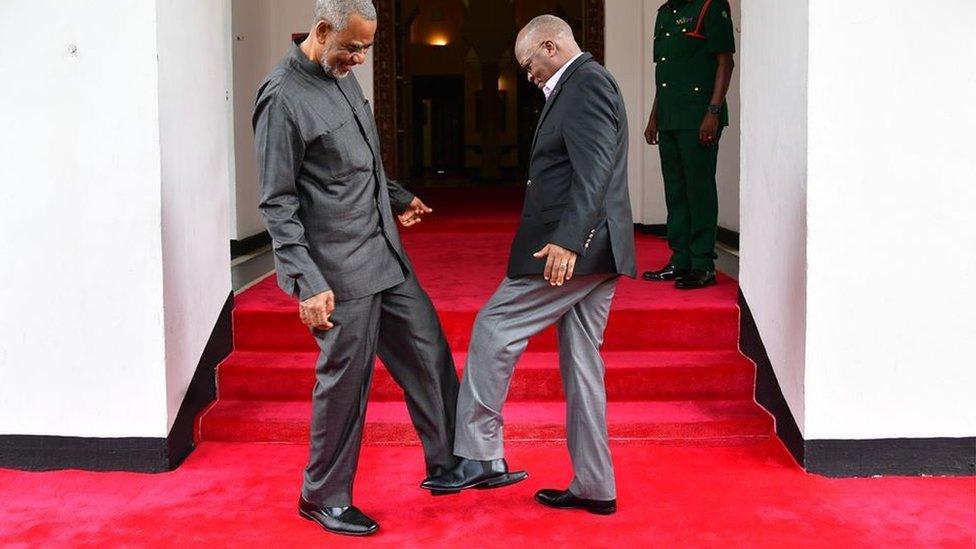
Shaking hands carries the risk of spreading coronavirus
Even before this, Mr Magufuli famously exchanged a foot greeting with opposition politician Maalim Seif Sharif Hamad at the presidential mansion as health experts warned that the virus could spread through handshakes.
Despite this, World Health Organization (WHO) Africa director Matshidiso Moeti accused Tanzania of acting slowly to curb the spread of the virus.
"In Tanzania we have observed that physical distancing, including the prohibition of mass gatherings, took some time to happen and we believe that these might have been probable factors that led to a rapid increase in cases there," the South African-born WHO official said in April.
Coronavirus is a devil. It cannot live in the body of Christ"

For his critics, one of Mr Magufuli's biggest mistakes has been to encourage religious services, sometimes without social distancing, despite the fact that most health experts say the risk of infections spreading is extremely high at such gatherings.
"Coronavirus is a devil. It cannot live in the body of Christ," the Tanzanian leader, who has a PhD in chemistry and is a devout Catholic, said in March.
And when Mr Magufuli addressed worshippers earlier this month, he said: "The corona disease has been eliminated thanks to God."
A few days later he appeared to row back on his statement, saying the virus was still around and urging people to continue to take precautions such as washing their hands regularly.
But on Tuesday, in his final parliamentary address before election campaigning started, Mr Magufuli repeated that God had spared Tanzania the virus, and called for all schools to reopen and for a return to normality.
Conspiracy theories
However on the same day, Prime Minister Kassim Majaliwa said Tanzania had 66 active coronavirus cases, releasing data for the first time since April when Mr Magufuli questioned the reliability of the figures.
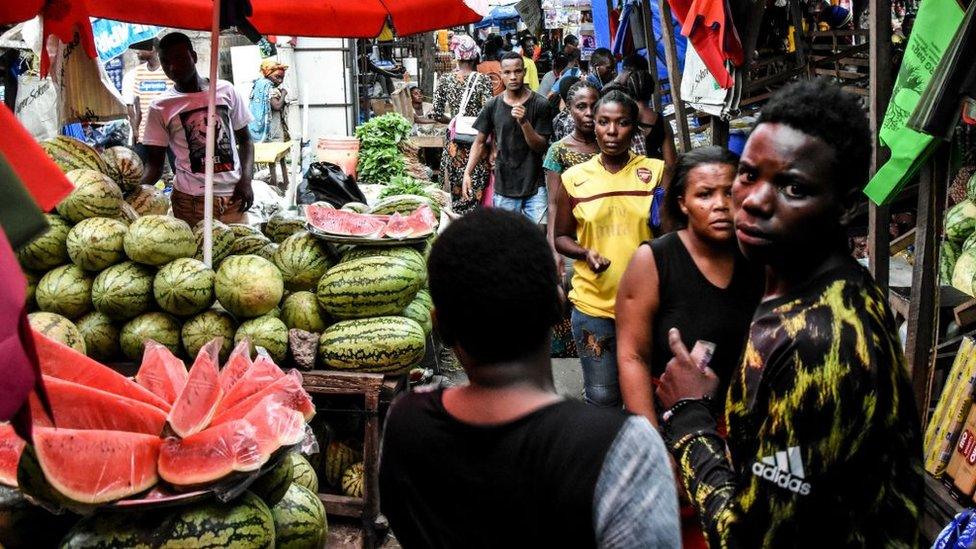
Mr Magufuli has insisted that businesses remain open despite the threat of Covid-19
In at least two previous speeches, Mr Magufuli described Tanzania's fight against the disease as "warfare", hinting that he saw it as a "Western plot".
"There are so many unbelievable things being done in this country. Either the imperialists have bought off the laboratory technicians, or they are not competent, which is not true," he said.
He also questioned the credibility of testing kits, without saying who had supplied them.
"So many times, I have insisted that not everything that you are given is good. There could be people being used, that equipment could be used… but it could also be sabotage because this is warfare," he said, lurching towards a conspiracy theory.
Magufuli is a 'piece of iron'
Mr Magufuli has also championed traditional medication, including steam inhalation and a Malagasy-produced tonic made from the artemisia plant, to fight the virus, despite the WHO saying there is no evidence that the treatment works.
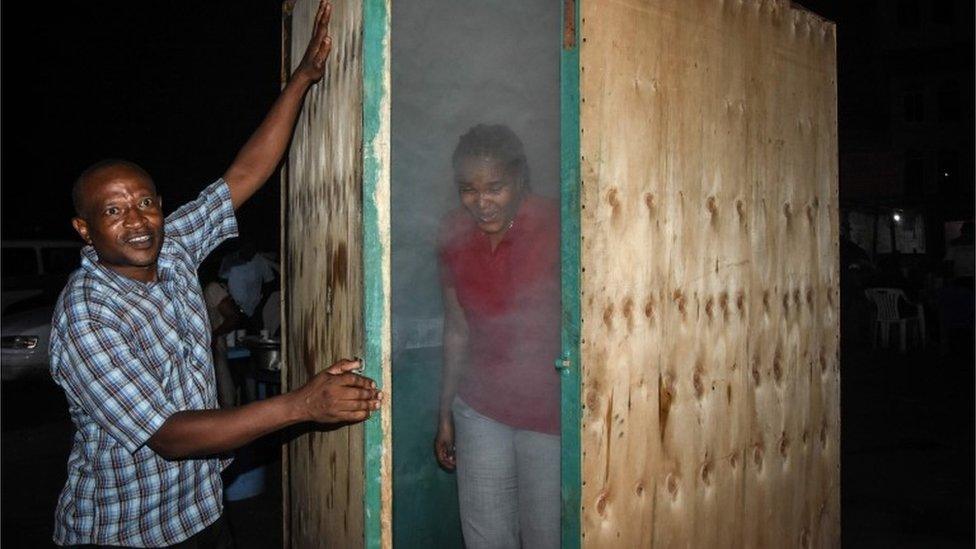
Steam inhalation booths have been set up in the main city Dar es Salaam by herbalists
"Magufuli sees African nations as allies, or at least, not 'mabeberu', and therefore, prefers to deal with them and seek out medical remedies from them rather than from elsewhere," Tanzanian political analyst Dan Paget said.
Many health experts believe the leaders - who also include Liberia's George Weah - are creating false hopes, but herbal medicine is part of the lives of most Africans. WHO data shows that 80% of them use it.
Whether Mr Magufuli's strategy has paid off will become clear in the coming months.
For now, he has strengthened his support among many African nationalists, religious conservatives, and businessmen, bolstering his chances of securing a second term in the October election.
When Mr Kikwete handed power to him in 2015, he said: "I'm leaving, but we've brought this chuma [Swahili for a piece of iron]."
It was an apt description of Mr Magufuli's style of leadership, which has been applauded by his supporters and loathed by his critics.